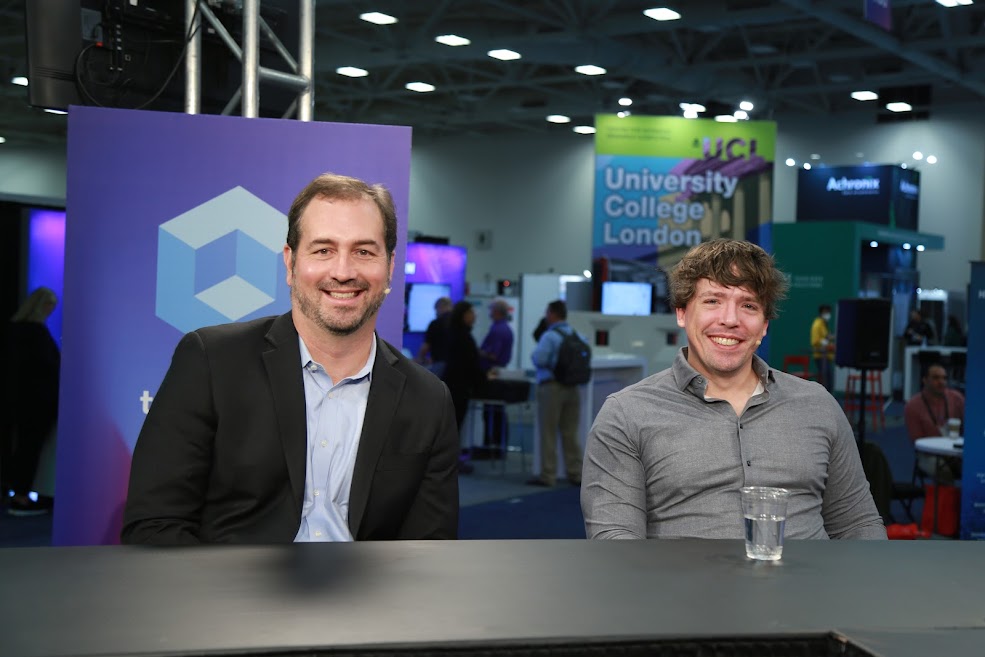 EMERGING TECH
EMERGING TECH
 EMERGING TECH
EMERGING TECH
 EMERGING TECH
EMERGING TECH
At the Supercomputing conference in Dallas this week, Dell Technologies Inc. teamed up with Intel to launch a new PowerEdge server that employs fully direct liquid cooling for energy expense reduction by up to 3.1 times.
Based on comments from a Dell executive in an exclusive interview at the event with SiliconANGLE, there will be more news coming from Dell on cooling solutions during what is expected to be a busy launch season in hardware releases next year.
“How do we enable the right air cooling solutions, how do we deliver the right liquid cooling solutions so that wherever the customer is in their environment and whatever footprint they have, we’re ready to meet it?” asked David Schmidt (pictured, left), senior director of server product management at Dell. “That’s something you’ll see as we go into the second half of launch season. You’re going to see some very compelling solutions, not just in air cooling but liquid cooling as well.”
Schmidt spoke with theCUBE industry analysts Paul Gillin and David Nicholson at SC22, during an exclusive broadcast on theCUBE, SiliconANGLE Media’s livestreaming studio. He was joined by Scott Clark (pictured, right), vice president and general manager of AI and HPC supercomputing application-level engineering at Intel, and they discussed recent announcements from both companies in the supercomputing space. (* Disclosure below.)
Ahead of SC22 this week, Intel unveiled its Max Series graphics processing units for support of high-performance computing and AI workloads. The latest iteration of the Intel Max Series includes oneAPI, an open model that allows developers to use a single code across multiple architectures. Intel’s commitment to oneAPI highlights a belief that the platform will appeal to developers targeting systems that use more than one type of processor.
“It’s open first, heterogeneous first,” Clark said. “You can take SYCL code, it can run on competitors’ hardware; it can run on Intel hardware. You have to believe that long term the future is open. In walled gardens, the walls eventually crumble.”
Both Intel and Dell have made a series of announcements in recent weeks designed to support enterprise AI workloads. As Dell continues to enhance is product lines, AI will remain a clear focus, according to Schmidt.
“Ninety percent of our platforms support GPUs, and 100% of our platforms support AI use cases,” Schmidt said. “There’s a lot of really compelling platforms that we’re starting to talk about, and it’s going to enable our customers to deliver AI in a variety of ways.”
Here’s the complete video interview, part of SiliconANGLE’s and theCUBE’s coverage of the SC22 event:
(* Disclosure: TheCUBE is a paid media partner for the SC22 event. Neither Dell Technologies Inc., the main sponsor for theCUBE’s event coverage, nor other sponsors have editorial control over content on theCUBE or SiliconANGLE.)
Support our mission to keep content open and free by engaging with theCUBE community. Join theCUBE’s Alumni Trust Network, where technology leaders connect, share intelligence and create opportunities.
Founded by tech visionaries John Furrier and Dave Vellante, SiliconANGLE Media has built a dynamic ecosystem of industry-leading digital media brands that reach 15+ million elite tech professionals. Our new proprietary theCUBE AI Video Cloud is breaking ground in audience interaction, leveraging theCUBEai.com neural network to help technology companies make data-driven decisions and stay at the forefront of industry conversations.